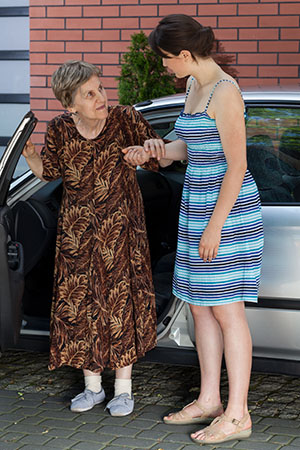As time goes on, most people find that they are no longer able to drive safely. Thinking about important topics early, like recognizing signs that it is no longer safe to drive and looking into other transportation options, can give you peace of mind when it is time to shift gears. It also helps you continue to stay connected with the activities and people you love.
Choose someone you trust to help you make a plan
Your friends and family can play a big role in your transition away from driving. Talking to them about driving early, even before there are any major concerns, can make the transition smoother when the time comes. It also gives them the chance to ask questions and share their thoughts.
It’s important that you are open and honest throughout the process. Ask someone you trust, like a friend, neighbor or family member, to help you plan. You don’t have to talk about everything all at once. Talking about transitioning away from driving can be overwhelming and emotional. It can be helpful to break the planning up into multiple conversations.
Creating a Driver Planning Agreement can help guide the process. You can use the template below from AAA and AOTA or create your own version that works for you. This gives you a clear roadmap to follow as you make important decisions about driving in the future.
Create your Driver Planning Agreement
Review the driver’s license renewal process
In North Carolina, you renew your driver’s license through the DMV.
- Under 66? You renew your driver’s license every 8 years.
- Over 66? You renew your driver’s license every 5 years.
When you go in person to get your license renewed, you will have to take a vision test.
In North Carolina, the DMV also oversees the Medical Review Program. If your family, friends, doctors, driver’s license examiner, or law enforcement have concerns about your ability to stay safe on the road they can request a Medical Evaluation. While this might seem scary, the goal is to keep you safe on the road.
Explore your transportation options to find the right fit
Finding the right transportation for you is important to continue participating in the daily and social activities you enjoy. In North Carolina, transportation options vary by community. To find out more about transportation options near you:
- Reach out to NC Transportation Providers
- Explore Public Transportation
- Reach out to your Area Agency on Aging
- Learn about ride-share services (Uber, Lyft, GoGoGrandparent)
- Check for On-Demand Microtransit (currently available in select NC areas)
- Search for Paratransit services in your city
- Contact local organizations (religious groups, community centers, National Volunteer Transportation Center)
- Talk to your friends and family about carpooling
To find the best transportation option for you, start by researching, talking to family and friends, and reaching out to organizations to ask questions. Some services offer travel training or transit orientation to walk you through how to use the service.
North Carolina Department of Health and Human Services, Transportation Services for Older Adults
Worksheet to research and compare transportation options
Safe Mobility for Life, My Transportation Plan Worksheet
CDC MyMobility Plan
Step by Step Guide: How to Download and Use Uber
Keep watching for changes
Review your symptoms often to watch for changes in your body and mind. Assess yourself, check-in with trusted family and friends, and follow-up with your doctor. Adjust your plan as needed to stay safe on the road.



